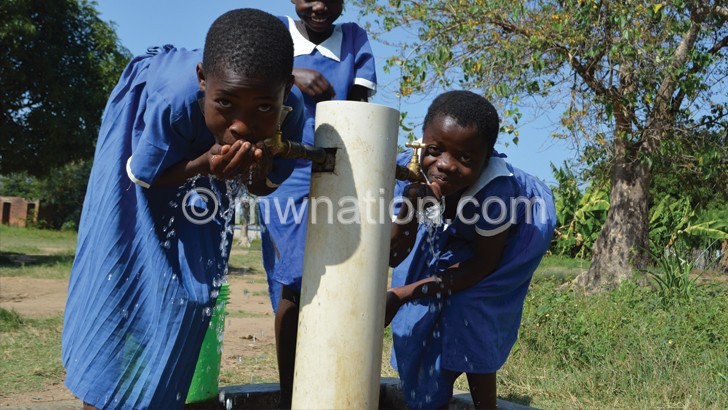Scotland targets 17 districts in water project
The Scottish government, through the Water Futures Programme is conducting assert mapping on water resources in selected districts of the country to come up with necessary interventions that will help Malawi achieve sustainable development goal number six which aims to ensure that by 2030 all people have easy access to potable water.
Speaking during a stakeholders meeting in Blantyre on Thursday, director of Climate Justice Fund for Water Futures Programme Professor Robert Kalin said in collaboration with the University of Strathclyde in Glasgow, the programme which started in Chikwawa in 2011 and expanded to seven other districts of the Southern Region in 2015 will from next year expand to 17 other districts across the country.
In March 2016, the Scottish government announced a boost in hydro nation support for the Climate Justice Fund to help improve lives of people in Malawi through better access to clean and safe water.
The University of Strathclyde was allocated £2 million for the next two years to extend the Water Futures Programme.
The funding is aimed at helping more communities in the Lower Shire Basin in Malawi access groundwater resources and be protected from the impacts of climate change.
The £2 million was the first extension of funding under the £12 million over four years – representing a doubling of funding for the Climate Justice Fund.
The project offers expert support and advice on water resource management to communities vulnerable to the adverse impacts of climate change, including erratic rainfall, droughts, floods and late onset of the rainy season.
Said Kalin: “The Scottish government has been working together with the government of Malawi for a long time. This is aimed at achieving sanitation and water for all. Since 2011, we have been working with Water for People and we are looking for a good working relationship with other Non-governmental Organisations (NGOs) and Councils from other districts.”
Kate Harawa, country Director for Water for People spoke of the need for proper monitoring when it comes to drilling boreholes to ensure proper recommendations are followed.
Harawa said on its part his organisation has been training borehole drillers to make sure they understand scientifically issues of water.
Adding to Harawa’s sentiments, regional irrigation and water development officer for the South in the Ministry of Agriculture, Irrigation and Water Development Phideria Moyo cautioned the public to be careful on who they hire to drill their boreholes adding that some may not be able to give them information on whether the water has the right contents suitable for consumption.
“People should follow proper channels when they want to drill boreholes. Our policy stipulates that only those registered with the National Construction Industry Council (NCIC) should be involved in drilling boreholes. Before being certified for drinking, water needs to be tested to establish if its alkaline content is consumable,” she explained.
The meeting brought together 15 organisations working in the water and sanitation sector to share ideas, lessons learnt and future prospects.





